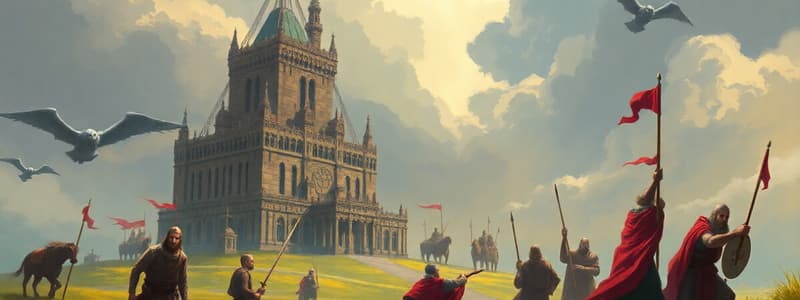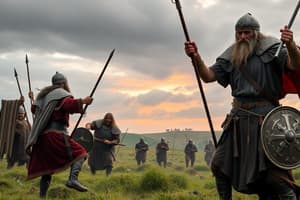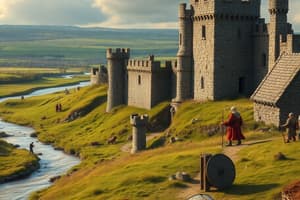Podcast
Questions and Answers
What major event occurred in 410 AD that significantly affected Britain?
What major event occurred in 410 AD that significantly affected Britain?
- The beginning of the Industrial Revolution
- The arrival of the Anglo-Saxons
- The start of the Norman Conquest
- The end of Roman rule in Britain (correct)
Which tribes are classified as the Anglo-Saxons?
Which tribes are classified as the Anglo-Saxons?
- Angles, Saxons, and Jutes (correct)
- Angles, Saxons, and Celts
- Jutes, Normans, and Saxons
- Angles, Picts, and Romans
What was the primary language of the Anglo-Saxons?
What was the primary language of the Anglo-Saxons?
- Old French
- Middle English
- Old English (correct)
- Latin
Which period in English literature follows the Anglo-Saxon Period?
Which period in English literature follows the Anglo-Saxon Period?
Which of the following years marks the beginning of the Age of Romanticism?
Which of the following years marks the beginning of the Age of Romanticism?
What significant social change occurred with the arrival of the Anglo-Saxons?
What significant social change occurred with the arrival of the Anglo-Saxons?
Which historical event occurred in 1066?
Which historical event occurred in 1066?
Which period in literature is characterized by works during the reign of Queen Elizabeth I?
Which period in literature is characterized by works during the reign of Queen Elizabeth I?
What is a key focus of the Revival of Learning period?
What is a key focus of the Revival of Learning period?
What literary age is defined by the period from 1900 to 1939?
What literary age is defined by the period from 1900 to 1939?
What significant impact did St. Augustine's arrival in 597 have on Anglo-Saxon society?
What significant impact did St. Augustine's arrival in 597 have on Anglo-Saxon society?
Which area in England became known as 'Danelaw'?
Which area in England became known as 'Danelaw'?
What was one of King Alfred the Great's major contributions to English society?
What was one of King Alfred the Great's major contributions to English society?
What was the primary reason for the mixing of Old English and French after the Norman Conquest?
What was the primary reason for the mixing of Old English and French after the Norman Conquest?
How did the Viking invasions affect the English language?
How did the Viking invasions affect the English language?
Which of the following best describes the literary character of 'Beowulf'?
Which of the following best describes the literary character of 'Beowulf'?
What event marked the end of the Anglo-Saxon literary period?
What event marked the end of the Anglo-Saxon literary period?
What motivated King Alfred to promote education during his reign?
What motivated King Alfred to promote education during his reign?
What was a common characteristic of the religions before the arrival of Christianity to the Anglo-Saxons?
What was a common characteristic of the religions before the arrival of Christianity to the Anglo-Saxons?
What was one result of the Christianization of the Anglo-Saxons?
What was one result of the Christianization of the Anglo-Saxons?
Flashcards
Anglo-Saxon Period
Anglo-Saxon Period
The period from 410 AD to 1066 AD in British history, marked by the arrival of Germanic tribes, particularly the Angles, Saxons, and Jutes, who established themselves in Britain and laid the foundations of modern English language and culture.
Anglo-Saxon Language
Anglo-Saxon Language
The language spoken by the Angles, Saxons, and Jutes, forming the basis of modern English.
Britons
Britons
The native Celtic inhabitants of Britain, who were displaced by the Anglo-Saxon invaders.
Anglo-Saxon Tribes
Anglo-Saxon Tribes
Signup and view all the flashcards
Roman withdrawal from Britain
Roman withdrawal from Britain
Signup and view all the flashcards
Anglo-Saxon Influence on Britain
Anglo-Saxon Influence on Britain
Signup and view all the flashcards
Roman rule in Britain
Roman rule in Britain
Signup and view all the flashcards
Anglo-Saxons as settlers
Anglo-Saxons as settlers
Signup and view all the flashcards
Cultural transformation in Britain
Cultural transformation in Britain
Signup and view all the flashcards
Anglo-Saxon Literature
Anglo-Saxon Literature
Signup and view all the flashcards
St. Augustine's Arrival
St. Augustine's Arrival
Signup and view all the flashcards
Old English
Old English
Signup and view all the flashcards
Monasteries as Centers of Learning
Monasteries as Centers of Learning
Signup and view all the flashcards
Viking Invasion
Viking Invasion
Signup and view all the flashcards
Danelaw
Danelaw
Signup and view all the flashcards
King Alfred the Great
King Alfred the Great
Signup and view all the flashcards
Anglo-Saxon Chronicle
Anglo-Saxon Chronicle
Signup and view all the flashcards
Norman Conquest
Norman Conquest
Signup and view all the flashcards
Middle English
Middle English
Signup and view all the flashcards
Study Notes
Anglo-Saxon Period (410-1066)
- 410 AD: Roman Empire leaves Britain, leading to Germanic invasions by Angles, Saxons, and Jutes.
- Anglo-Saxon People: Settling in Britain, establishing Anglo-Saxon culture, and language (Old English). Native Britons move to Wales, Scotland, Ireland, and Cornwall.
- 597 AD: St. Augustine introduces Christianity, leading to the creation of monasteries, which become centers for learning and writing. Prior to Christianity, storytelling was primarily oral. The mixing of Christian beliefs and Anglo-Saxon traditions significantly impacted literature.
- 793 AD: Viking invasions begin, raiding monasteries and eventually settling in the north and east of England (Danelaw).
- Viking Influence: Introducing new words into the English language (like "sky," "egg," "they," "take") and influencing storytelling traditions with tales of bravery and adventure.
- 871-899 AD: King Alfred the Great's reign. Significant for establishing English education. He ordered translations of important books into Old English from Latin. Initiated the creation of "Anglo-Saxon Chronicle"- a key historical record of that period.
- 1066 AD: Norman Conquest by William the Conqueror. William defeats King Harold at the Battle of Hastings, becoming king. Normans establish French as the language of the upper class, influencing the language and culture. The blending of Old English and French creates Middle English. The Anglo-Saxon period ends.
Studying That Suits You
Use AI to generate personalized quizzes and flashcards to suit your learning preferences.




